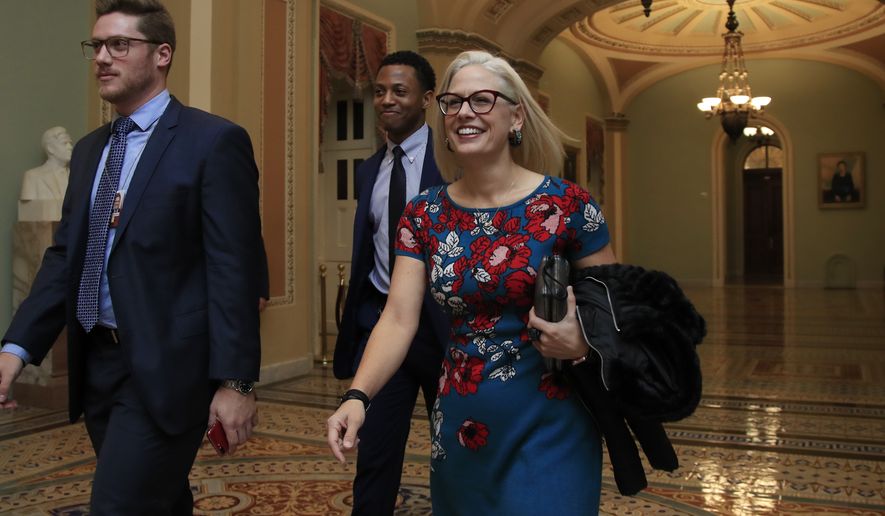A bipartisan group of senators announced on Thursday they had reached a “tentative” infrastructure deal that funds major improvements to the nation’s roads and bridges, but both Democrats and Republicans voiced deep skepticism that the compromise would survive.
“Our group — comprised of 10 senators, 5 from each party — has worked in good faith and reached a bipartisan agreement on a realistic, compromise framework to modernize our nation’s infrastructure and energy technologies,” the senators said in a joint statement. “This investment would be fully paid for and not include tax increases.”
The group, which is led by Democratic Sen. Kyrsten Sinema of Arizona and Republican Sen. Mitt Romney of Utah, is eyeing upwards of $1.2 trillion in infrastructure spending. Of that sum, $579 billion would be new revenue coming from sources not yet defined.
Despite the announcement, the deal has yet to be presented to either the White House or congressional leaders. It is unclear whether either will find it acceptable.
Earlier this week, President Bident opted to jettison talks with Senate Republicans on the topic because of the party’s unwillingness to raise taxes to pay for new infrastructure spending.
“Questions need to be addressed, particularly around the details of both policy and pay for, among other matters,” the White House said in a statement responding to news of the tentative agreement.
“Questions need to be addressed, particularly around the details of both policy and pay for, among other matters,” the White House said in a statement responding to news of the tentative agreement.
Similarly, factions in both parties on Capitol Hill are wary of a bipartisan infrastructure deal.
Progressive Democrats, in particular, fear a smaller spending package will prioritize fixing the nation’s roads and bridges, over combating climate change. As such, prominent figures on the left have threatened to withhold their support if the bipartisan package is not “sufficiently green.”
“There is little appetite in our caucus for an infrastructure plan that ignores the greatest crisis, the most existential crisis that we face,” said Sen. Martin Heinrich, New Mexico Democrat and an avowed environmentalist.
Democratic Sen. Edward J. Markey of Massachusetts, the author of the Green New Deal, was even blunter, declaring on social media: “no climate, no deal.”
Complicating matters is that it is unclear whether Republicans would back the deal.
Many GOP lawmakers have balked at the overall sum being discussed, with some arguing anything above $1 trillion is a non-starter. Furthermore, Republicans also remain conflicted over how to pay for the new spending, something the bipartisan group has refrained from making public.
This means that Mr. Biden will have to rely on near-universal support from Democrats, who only narrowly control Congress, to get any deal across the finish line. And that reality has progressives feeling empowered.
The Congressional Progressive Caucus counts at least 92 Democrats among its membership in the House. Although no such association exists within the Senate, progressives make up at least a quarter of that chamber’s Democratic majority.
“I don’t know that there’s a scenario in which you can lose 10 Democrats and get 60 votes in the Senate [to overcome a filibuster], so this package ultimately is going to have to have the sign off of every single Democrat,” said Sen. Chris Murphy, Connecticut Democrat.
Getting the progressives on board, however, may just wind up destroying any hope for Republican support.
Mr. Biden’s initial talks with the Senate GOP broke down, in part, over the definition of infrastructure. The White House initially proposed spending about $2.25 trillion, with most of the money earmarked for social welfare and combating climate change.
Republicans rejected not only the figure but also the scope, arguing infrastructure spending should focus exclusively on repairing and upgrading the nation’s roads, bridges, airports and similar facilities.
“The bipartisanship that has defined infrastructure policy for years is becoming the exception to Democrats’ new partisan rule,” said Senate Minority Leader Mitch McConnell, Kentucky Republican. “Our Democratic friends have taken to using ’infrastructure’ as a code for a growing wishlist of unrelated liberal spending.”
The bipartisan group led by Ms. Sinema and Mr. Romney seems to agree. Their “tentative” framework prioritizes upgrading existing transportation systems, while bowing slightly to Mr. Biden’s green energy ambitions by providing money for electric vehicle charging stations.
“There’s some infrastructure there, for instance … charging stations [are] infrastructure,” said Sen. Rob Portman, Ohio Republican.
It is uncertain, though, whether that will be enough to bring along progressive Democrats. Many on the left are pining for the White House to abandon bipartisanship and commit to proceeding on strictly party lines.
“In case it wasn’t clear already, it certainly is now: Republicans are not going to do what needs to be done for working families,” said Democratic Rep. Pramila Jayapal of Washington, the chairwoman of the Congressional Progressive Caucus.
Ms. Jayapal and allies urge the White House to use the budget reconciliation process, a process that allows spending bills to pass the Senate with a simple majority of 51 votes, to enact a “big, bold and green” infrastructure package.
However, such calls are only hampering potential bipartisan support for a conventional infrastructure deal.
GOP lawmakers suspect that the White House may agree to a bipartisan watered-down infrastructure package focusing on roads and bridges, while then opting to move its more controversial climate and social agenda through reconciliation.
Senate Majority Leader Charles E. Schumer has already hinted that might be the overall strategy by promising to begin the reconciliation process regardless of how bipartisan talks go.
“We continue to proceed on two tracks, a bipartisan track and a reconciliation track and both are moving forward,” the New York Democrat said.
• Haris Alic can be reached at halic@washingtontimes.com.




Please read our comment policy before commenting.